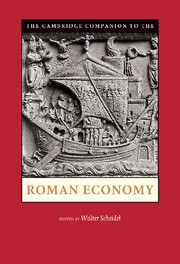Book contents
- Frontmatter
- Contents
- List of Figures
- Note on the Contributors
- Abbreviations
- The Roman world at the time of Marcus Aurelius
- 1 Approaching the Roman economy
- Part I Theory
- 2 Roman economic thought
- 3 The contribution of economics
- 4 Human capital and economic growth
- Part II Labor
- Part III Production
- Part IV Distribution
- Part V Outcomes
- Further reading*
- Bibliography
- Index
4 - Human capital and economic growth
from Part I - Theory
Published online by Cambridge University Press: 05 February 2013
- Frontmatter
- Contents
- List of Figures
- Note on the Contributors
- Abbreviations
- The Roman world at the time of Marcus Aurelius
- 1 Approaching the Roman economy
- Part I Theory
- 2 Roman economic thought
- 3 The contribution of economics
- 4 Human capital and economic growth
- Part II Labor
- Part III Production
- Part IV Distribution
- Part V Outcomes
- Further reading*
- Bibliography
- Index
Summary
Economists seeking to explain the unparalleled economic growth of the nineteenth and twentieth centuries have paid increasing attention to human capital – that is, the education, training, and health of the labor force. Over the past two centuries higher levels of education have provided the foundation for discovery of new knowledge and the resulting technological advances needed to sustain growth over long periods at unprecedented rates. Training and education of the work force has enabled the technology to be used in economic production. And the life span and health of the population have improved to permit longer life spans and more intensive use of the skills. The magnitude of these gains is striking, as the average life span has more than doubled and the productivity per worker has increased by an order of magnitude in the most developed economies.
Roman historians have considered various aspects of the subject, but none has conceptualized a study of the Roman economy based on human capital. This is not surprising, since only in the second half of the twentieth century, when investments in human capital have come to dominate investments in physical capital, has it become clear to economists that the quality of labor is a major driver of growth. In the absence of reliable quantitative data for Rome, this chapter aims to provide a description of the levels of education and training of various sectors of the Roman labor force, an analysis of the extent of institutionalization of education and training, and some broad comparisons with other pre-industrial economies in order to assess Rome's level of economic development. The challenge is to add precision to the assessment of Keith Hopkins (1995/96) of “modest, though significant growth” of the Roman economy. While it is not possible to calculate a growth rate with any confidence, it is possible to assess Roman institutions for education and training against those of other pre-modern economies. I will argue that Roman imperial levels of urbanization, education, and literacy (unsurprisingly) exceeded those of previous societies, but fell noticeably short of the most advanced societies of early modern Europe before the industrial revolution. On the one hand, Rome benefited from the more intense exchange of knowledge and differentiation of labor that generally comes with higher levels of urbanization; on the other hand, Rome was not able to break out of the contradiction that more intense urbanization also brought higher mortality.
- Type
- Chapter
- Information
- The Cambridge Companion to the Roman Economy , pp. 71 - 86Publisher: Cambridge University PressPrint publication year: 2012
- 6
- Cited by



